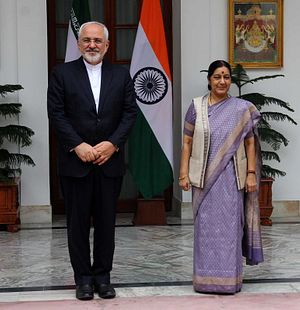Iranian Foreign Minister Javad Zarif, still fresh from having successfully arrived at a final deal over the country’s nuclear program with a group of world powers in Vienna some weeks ago, arrived in India where he met with Indian Prime Minister Narendra Modi, External Affairs Minister Sushma Swaraj, and a range of other senior officials. Zarif arrived in India after a visit to Pakistan where he met senior officials there as well. Though the details of what Zarif discussed with Indian officials remain sparse—there were no major joint declarations issued—it is likely that the two sides discussed ways to expand their cooperation in light of the Joint Comprehensive Plan of Action (JCPOA) on Iran’s nuclear program, which will largely open up Iran’s economy after years of crippling economic sanctions.
Notably, Zarif met with India’s Minister of Transportation Nitin Gadkari to discuss Indian investment in the strategically critical Iranian port of Chabahar. For India, Chabahar is of particular importance as it will allow Indian goods to have land access to Afghanistan, bypassing Pakistan entirely. New Delhi also sees a port in Chabahar as a strategic counterweight to China’s pursuit of a civilian port facility in the Pakistani coastal city of Gwadar. Progress on Chabahar, however, has been sluggish for both sides. Zarif appeared sanguine for the prospects of accelerating progress on Chabahar: “We both, India and Iran, are eager to engage in this. I believe sooner rather than later we will start serious work,” he told reporters in New Delhi.
Zarif’s trip to New Delhi comes not long after Modi met with Iranian President Hassan Rouhani on the sidelines of the Shanghai Cooperation Organization (SCO) summit in Ufa, Russia. Both Iran and India are observers of the SCO; India will gain membership to the organization next year, and Iran is expected to follow. The Indian prime minister’s office wanted to emphasize a degree of continuity between the Ufa talks and Zarif’s visit. Vikas Swarup, the spokesperson for the Indian Ministry of External Affairs, noted on Twitter: “Continuing engagement. After meeting President @HassanRouhani in Ufa, PM @narendramodi receives FM @JZarif in Delhi.”
Though the implementation of the JCPOA faces hurdles—mostly in the U.S. legislature—India is fast preparing to expand its relationship with Iran. Relations between Tehran and New Delhi remained friendly during Iran’s years of global ostracization for its nuclear program, with a few notable exceptions (for instance, in 2009, India joined the U.S. in voting against Iran in a resolution passed by the International Atomic Energy Agency). Beyond Chabahar and infrastructure projects, India’s strategy following the JCPOA will likely emphasize increased energy and broader strategic cooperation, per the 2003 “New Delhi Declaration” which formalized a strategic partnership between the two countries.

































